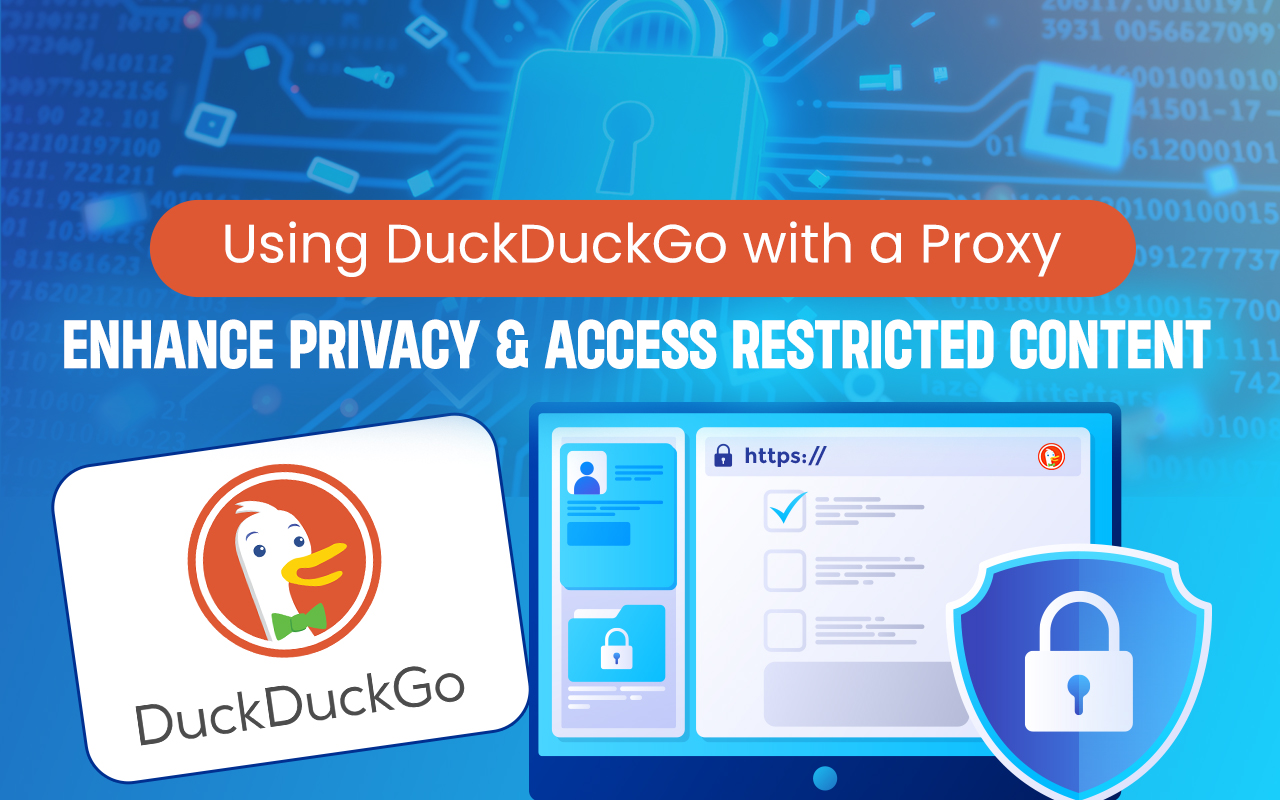
DuckDuckGo is widely regarded as a privacy-centric search engine, attracting users who value anonymity online. Combining DuckDuckGo with a proxy amplifies this focus on privacy while enabling users to bypass geo-restrictions. This article explores how to use DuckDuckGo with a proxy, its benefits, and the essential considerations for a secure and seamless browsing experience.
What Is DuckDuckGo and Why Use It?
DuckDuckGo is a search engine designed to prioritize user privacy. Unlike traditional search engines, DuckDuckGo:
- Does not track your activity: It refrains from collecting or storing personal data, ensuring anonymity.
- Avoids personalized search results: Everyone sees the same results for the same search query.
- Blocks third-party trackers: With its built-in tracker blocker, DuckDuckGo prevents advertisers from profiling users.
In a world where data breaches and invasive tracking are common, DuckDuckGo has become a trusted choice for privacy-conscious individuals. However, accessing this search engine may still pose challenges in some restricted regions or networks.
To bypass these restrictions and maintain privacy, you can use DuckDuckGo proxies from a reliable provider like Live Proxies, allowing secure access to the search engine while preserving your anonymity.
Why Pair DuckDuckGo with a Proxy?
A proxy acts as an intermediary between a user and the internet, masking the user’s IP address and providing anonymity. When combined with DuckDuckGo, a proxy can:
- Bypass Geo-Restrictions: Proxies enable users to access DuckDuckGo from regions where it may be restricted or blocked.
- Enhance Anonymity: By hiding the user’s IP address, proxies further protect their identity.
- Enable Access to Restricted Content: Some networks (e.g., workplaces or schools) may restrict DuckDuckGo. Using a proxy overcomes these barriers.
- Avoid Bandwidth Throttling: ISPs often throttle bandwidth for specific websites. Proxies can circumvent such limitations, ensuring faster access.
Types of Proxies Compatible with DuckDuckGo
To maximize privacy and usability, selecting the right type of proxy is critical. Here are the main options:
Residential Proxies
Residential proxies use IP addresses assigned by Internet Service Providers (ISPs) to genuine users. These are highly reliable and difficult to detect.
- Best for: Avoiding detection and accessing restricted content. Similarly, businesses running eCommerce platforms benefit from added layers of performance and security with dedicated Magento Hosting solutions.
- Drawback: Typically more expensive than other options.
Datacenter Proxies
Datacenter proxies operate from dedicated servers, making them faster and more affordable.
- Best for: High-speed browsing and cost-effective solutions.
- Drawback: More prone to detection by anti-proxy measures.
Rotating Proxies
Rotating proxies change IP addresses periodically, ensuring continuous anonymity.
- Best for: Tasks requiring sustained privacy, such as web scraping or accessing sensitive content.
- Drawback: Configuration may be complex for non-technical users.
Free vs. Paid Proxies
While free proxies may seem appealing, they often come with risks like poor performance, unreliable uptime, and potential exposure to malicious actors. Opting for a paid proxy service is strongly recommended to ensure security and stability.
How to Use DuckDuckGo with a Proxy
Getting started with DuckDuckGo and a proxy is straightforward. Here’s a step-by-step guide:
1. Choose a Reliable Proxy Provider
Research reputable providers that offer the type of proxy you need (e.g., residential, datacenter).
2. Set Up the Proxy
- For browser-based proxies, configure the settings directly in your browser or use extensions.
- For system-wide proxies, input the proxy details in your device’s network settings.
3. Access DuckDuckGo
Visit DuckDuckGo.com and conduct searches as usual.
4. Test Anonymity
Use online tools to verify your IP address and ensure the proxy is functioning correctly.
Validated Data: Privacy Concerns and Proxy Use
According to a 2023 study by Statista, 64% of internet users worldwide are concerned about their online privacy. This figure highlights the growing demand for tools like DuckDuckGo and proxies to safeguard personal data.
Additionally, a report from Digital Information World revealed that 45% of users employ proxies primarily for bypassing geo-restrictions, underscoring their role in unrestricted access to content.
Best Practices for Safe Proxy Use
While using DuckDuckGo with a proxy enhances privacy, it’s important to follow best practices to avoid potential risks:
- Use HTTPS: Ensure all connections are secured with HTTPS to prevent data interception.
- Avoid Free Proxies: As noted earlier, free proxies often compromise security.
- Rotate IPs: If available, use rotating proxies to minimize detection risks.
- Check Proxy Policies: Confirm that your proxy provider does not log your activities.
Conclusion
By using DuckDuckGo with a proxy, users can unlock enhanced privacy, bypass geo-restrictions, and enjoy unrestricted access to the internet. Selecting the right proxy type and following best practices ensures a secure and seamless experience.
For those looking to protect their online identity and access DuckDuckGo without restrictions, integrating a proxy into your browsing routine is a powerful step toward digital freedom.
Share this post
Leave a comment
All comments are moderated. Spammy and bot submitted comments are deleted. Please submit the comments that are helpful to others, and we'll approve your comments. A comment that includes outbound link will only be approved if the content is relevant to the topic, and has some value to our readers.

Comments (0)
No comment